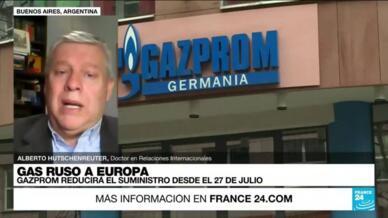First modification:
The announcement of the cut in the supply of Russian gas to Western Europe through the Nord Stream 1 gas pipeline from July 27 does not have “technical reasons”, according to the German Government after learning of the decision of the Russian supplier, which said that capacity will be reduced at 20%.
European Union countries were seeking common ground to wean themselves off their dependence on Russian natural gas, trying to appease domestic consumers and maintaining unity while Moscow turns off the tap.
Russian President Vladimir Putin denies using gas exports to pressure the bloc to reduce its sanctions for the war in Ukraine, but the truth is that for months he has been limiting gas shipments to the old continent. Ukrainian President Volodymyr Zelensky called the Kremlin’s use of gas cuts a “form of terror.”
On the eve of an emergency meeting to discuss plans to reduce the European Union’s gas consumption by 15% over the next few months, representatives of the community club are still negotiating a possible compromise that should keep the 27 countries in line to Tuesday night in Brussels.
“We have taken note of the announcement. We are monitoring the situation very closely in close contact with the Federal Network Agency and the gas crisis team,” the German Ministry of Economics and Climate Protection announced. “According to our information, there are no technical reasons for a reduction in shipments,” they concluded.
“Sanctions clearance requirements for the delivery of the turbine in question have been met. Canada has granted the waiver required by Canadian law. Under EU sanctions law, no waiver is required,” the note says. German.
“Russia is weighing its energy deterrence capacity”
The Russian energy company Gazprom linked the new reduction to the technical condition of a turbine after the deadline for a new capital repair. Russia currently supplies only 40% of normal gas flows because it awaits the return of one of its Siemens turbines, which has been blocked in Canada by sanctions.
“I believe that, at this point in the confrontation, Russia is weighing in on its energy deterrence capabilities. Russia knows that it can play this card, which is a weapon in the hands of Russia,” Alberto Hutschenreuter, Doctor in International Relations, told France 24.

“This indicates the beginning of an economic energy catastrophe for Europe, which does not want the Hungarian model to prevail, where countries establish in their own way the type of relationship they will have with Russia,” added the expert.
The bloc is preparing for a possible complete cut off of natural gas supplies by Russia, which could cause a big cooling in the coming winter, leaving countries like Germany especially exposed. Although others like Spain and Portugal, which depend little on Russian gas, do not want to force such a significant cut in their population.
“Nord Stream is more geopolitical than energetic. This implied a change of scale for Europe and particularly for Germany. The latter is not interested in this energy break with Russia, since the distance is not only shorter for the flow of gas, but also the transport of gas through the expanded pipeline (Nord Stream 2), implies the transfer of gas from territory to territory. Hutschenreuter commented.
Russia has cut or reduced gas supplies to a dozen EU countries in retaliation for the imposed sanctions. The cuts to the Nord Stream 1 pipeline further jeopardize the goals of filling Europe’s gas reservoirs for the winter, when there is traditionally a surge in demand.
It was what the president of the European Commission, Ursula Von der Leyen, warned when she announced the plan. Von der Leyen is convinced that Putin will cut off natural gas exports in an attempt to wreak economic and political havoc in Europe next winter.
With AP and EFE













Add Comment